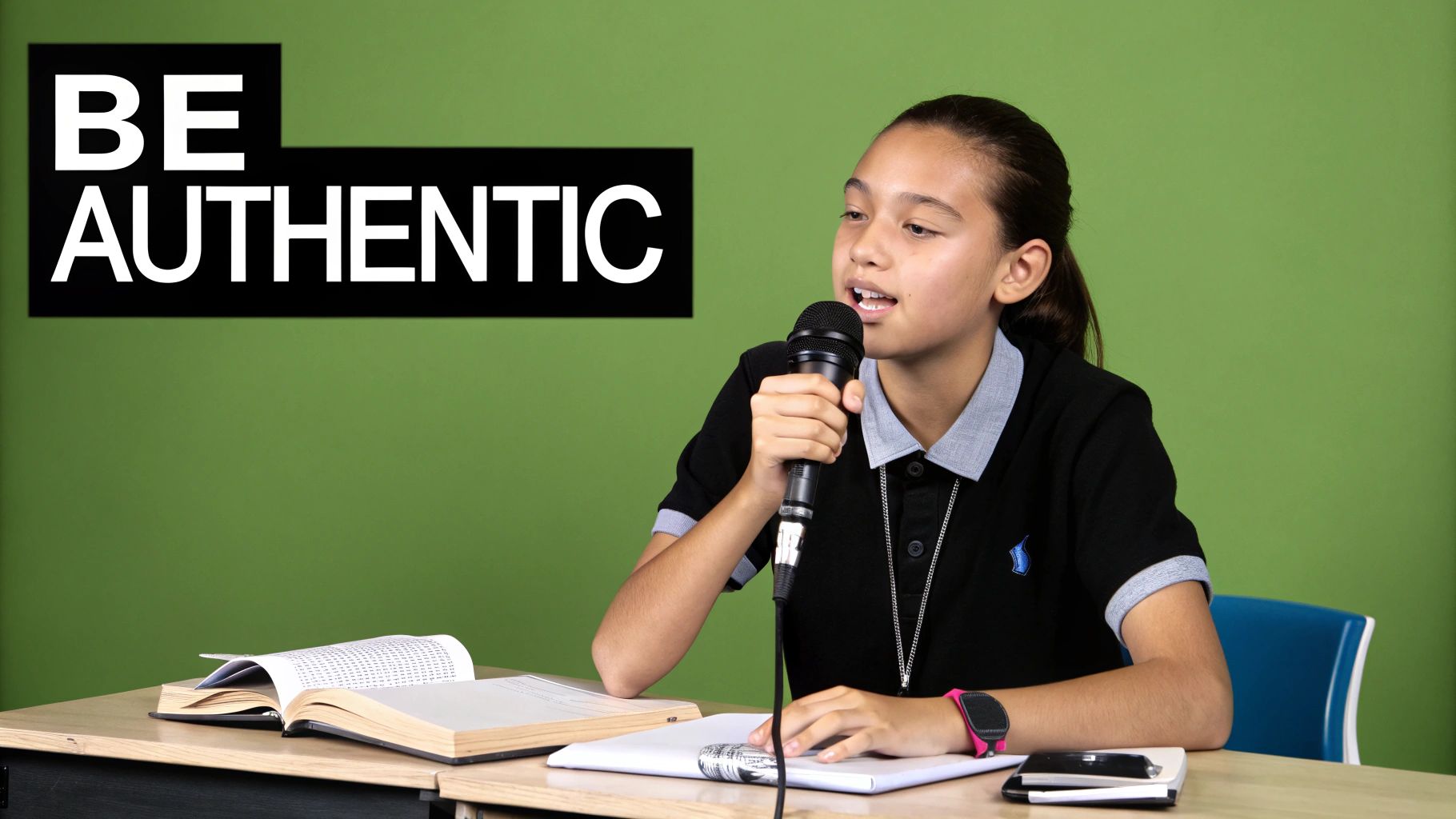The college application essay can feel like the most daunting part of the process, a single page meant to capture your entire story. For both students and the parents supporting them, this high-stakes task can trigger significant stress, procrastination, and anxiety. The pressure to perfectly encapsulate seventeen years of life into 650 words is immense, often leading to writer's block and a crisis of confidence. But what if the essay wasn't just another hurdle, but an opportunity for genuine self-reflection and growth?
This guide offers more than just writing advice; it's a holistic set of college application essay tips designed to navigate the emotional and practical challenges of this milestone. We'll move beyond generic suggestions and provide actionable, coach-backed strategies to help you manage the pressure, find your authentic voice, and transform your unique experiences into a compelling narrative. These techniques are crafted to help you overcome procrastination, build the motivation to start, and ultimately write an essay that truly reflects who you are. By focusing on your personal journey and insights, you can create a standout story that showcases your potential and connects with admissions officers on a human level.
1. Start with a compelling hook
Admissions officers read thousands of essays. Yours has just a few seconds to make an impression. The opening line, or hook, is your single best tool to grab their attention and make them eager to read on. A powerful hook acts as a trailer for your story, creating immediate curiosity and setting the emotional tone for the rest of your essay.
This initial engagement is crucial. A bland opening risks blending into the sea of applications, while a compelling one makes your essay memorable. This is one of the most effective college application essay tips because it frames how the reader perceives your entire narrative from the very beginning.

How to Craft a Winning Hook
A great hook doesn't just shock; it invites the reader into a specific moment or idea that is central to your essay's theme. It should feel authentic to your voice and experience, not like a gimmick.
Consider these powerful approaches:
- Start with intriguing dialogue: "'You're not going to make it,' the doctor told my grandmother." This immediately creates tension and raises questions.
- Use a surprising statement: "I’ve failed at something every single day for the past three years." This subverts expectations and signals a story of resilience and learning.
- Engage the senses: "The acrid smell of burnt circuits filled my bedroom as I celebrated my first successful robot." This paints a vivid picture and drops the reader directly into a key moment.
Expert Insight: "Your hook must connect directly to the core message of your essay. A shocking opening that doesn't relate to your story will feel disconnected and confusing. The goal is to create intrigue, not confusion."
Putting It Into Practice
Brainstorming a hook can be a great way to overcome procrastination, a common hurdle for students feeling overwhelmed by the application process. Don't try to write the perfect hook first. Instead, try writing five different opening lines for your essay idea and see which one feels most natural and exciting.
Ask a parent, teacher, or friend to read only your opening lines and tell you which one makes them most want to keep reading. This feedback is invaluable. Remember, the goal is to find an opening that is both attention-grabbing and a genuine reflection of the story you are about to tell.
2. Show, don't tell
Admissions officers want to understand who you are, not just be told. The principle of "show, don't tell" is about demonstrating your qualities through vivid stories and concrete actions rather than listing them as abstract traits. Stating "I am persistent" is forgettable; describing the late nights you spent debugging a line of code until you finally found the error is compelling proof.
This narrative technique brings your character to life, making your essay more believable and engaging. It’s one of the most powerful college application essay tips because it allows the reader to reach their own conclusions about your strengths. This approach transforms your essay from a simple resume into a memorable story that reveals your personality in action.

How to Demonstrate Your Qualities
To effectively show instead of tell, you need to zoom in on specific moments. Think like a film director: what scene from your life best illustrates your curiosity, leadership, or resilience? Your goal is to immerse the reader in that experience.
Consider these powerful transformations:
- Instead of telling: "I am compassionate and care about my community."
- Show by describing an action: "Every Tuesday at 6 AM, I unlock the community garden gates to check on the tomatoes Mrs. Chen planted, weeding around the fragile stems before the sun gets too high."
- Instead of telling: "I learned the value of persistence."
- Show by detailing a struggle: "After my third rejection from the literary magazine, I spent two weeks researching new story angles, rewrote my ending, and submitted my piece one more time."
Expert Insight: "Your actions are your best evidence. Let your choices and behaviors narrate your character. An admissions officer will be far more convinced by a story of you leading a difficult project than by a simple claim that you are a good leader."
Putting It Into Practice
Showing, not telling, is a skill that takes practice. To get started, list the top three qualities you want to convey in your essay. For each quality, brainstorm a specific, real-life story where you actively demonstrated it. Don't worry about perfection; just get the core memory down on paper.
Next, try to add sensory details to your chosen story. What did you see, hear, or feel in that moment? Using vivid language helps the reader step into your shoes. This focused, narrative approach can also alleviate the pressure of having to sound impressive, allowing your genuine experiences to speak for themselves and making the writing process feel more authentic and less overwhelming.
3. Choose a focused, specific topic
Many students believe a college essay should be a grand summary of their life’s achievements, but the opposite is true. A powerful essay zooms in on a single, specific moment or experience, exploring it in detail. Trying to cover too much ground results in a shallow narrative that fails to reveal your personality or depth of thought.
Focusing on one small story allows you to unpack its significance and show, not just tell, who you are. This is one of the most critical college application essay tips because it transforms a generic topic into a personal, memorable narrative. A narrow focus gives your story the space it needs to breathe and make a genuine connection with the reader.

How to Craft a Focused Narrative
The key is to find the "small story" that reveals a "big idea" about you. Instead of writing about your love of science, write about the afternoon you spent discovering bioluminescence in your backyard pond. This specific instance says far more about your curiosity and passion than a broad statement ever could.
Consider these examples of shifting from broad to focused:
- Instead of: "My high school experience."
Focus on: "The day I taught my grandmother how to use FaceTime." - Instead of: "Overcoming challenges."
Focus on: "Learning to cook for my family after my mother's surgery." - Instead of: "My passion for volunteering."
Focus on: "The conversation with one elderly resident that changed my perspective on listening."
Expert Insight: "Your entire life isn't the story; a single moment is. Admissions officers learn more from the intricate details of one meaningful experience than they do from a rushed summary of four years of high school."
Putting It Into Practice
Feeling overwhelmed or procrastinating on your essay often stems from the pressure to choose a "perfect" topic. The solution is to think small. Don't search for a life-altering event; look for a moment of quiet realization, growth, or change. These often make the most compelling stories.
Brainstorm by listing small, specific memories: a difficult conversation, a surprising discovery, or a time you failed and what came next. Choose a moment that still makes you feel something. This genuine emotion will be the engine of your essay, making the writing process feel more natural and less like a chore. This focused approach not only improves your essay but can also alleviate the anxiety that fuels procrastination.
4. Reveal your authentic voice
Admissions officers aren't looking for a perfect, thesaurus-wielding scholar; they're looking to meet a real person. Your authentic voice is your unique fingerprint in the application pile. It's the collection of your personality, quirks, humor, and way of seeing the world. Trying to sound more "academic" or like someone you're not often backfires, creating an essay that feels stiff and impersonal.
Embracing your genuine voice is one of the most powerful college application essay tips because it builds a direct, human connection with the reader. It allows your personality to shine through the page, making your story more memorable and engaging. This authenticity shows maturity and self-awareness, qualities that colleges deeply value.

How to Let Your True Voice Emerge
Writing with an authentic voice means translating your genuine thoughts and feelings onto the page without a filter of what you think an admissions officer wants to hear. It's about being honest and vulnerable in your storytelling.
Consider these approaches to tap into your natural style:
- Show your genuine curiosity: "I couldn't stop wondering why some plants glow in the dark while others don't." This reveals an inquisitive mind in a natural way.
- Use your natural humor: "My cooking disasters have become legendary in my family, and not in a good way." This shows self-awareness and makes you relatable.
- Include personal quirks: "I organize my bookshelf not by author or genre, but by the emotional impact of each book." This offers a unique and memorable glimpse into your personality.
Expert Insight: "Students often feel pressure to perform and present a flawless version of themselves. But authenticity is far more compelling than perfection. Don't be afraid to share a moment of confusion, failure, or nerdy excitement. That's where your true character is revealed."
Putting It Into Practice
The fear of not sounding "smart enough" can be a major source of writer's block and procrastination. To combat this, start by writing a "zero draft" where you just tell your story as if you were talking to a friend. Don't worry about grammar or vocabulary.
Read your essay out loud. Does it sound like you? If you stumble over words or the sentences feel awkward, you’ve likely strayed from your natural voice. Another great tip is to ask parents or close friends if the essay truly captures your personality. Developing the confidence to be yourself is a crucial skill for college and beyond. For more guidance on this, learn more about embracing your authenticity on andrewpetrillolifecoaching.com.
5. Demonstrate growth and reflection
Your college essay is not just a list of accomplishments; it’s a window into your character and potential. Admissions officers are looking for students who are mature, self-aware, and capable of learning from their experiences. Demonstrating growth and reflection shows them you possess the very qualities that predict success in college and beyond.
This is more than just stating you learned a lesson. It’s about illustrating the process of change. By narrating how an experience altered your perspective, challenged your assumptions, or taught you a new skill, you provide concrete evidence of your ability to evolve. This is one of the most powerful college application essay tips because it showcases your readiness for the intellectual and personal challenges of higher education.
How to Showcase Authentic Growth
The key to showing growth is to move from the "what happened" to the "so what." Avoid generic clichés like "I learned from my mistakes." Instead, connect a specific event to a tangible shift in your mindset or behavior.
Consider these approaches to frame your story:
- Show a changed perspective: "Working at the food bank shifted my understanding of community hunger from a distant concept to a neighbor's immediate reality, forcing me to rethink my role in local advocacy."
- Reflect on a failure: "Losing the state debate tournament wasn't a failure of preparation, but a lesson in adaptability. It taught me that listening to my opponent was more powerful than just waiting for my turn to speak."
- Illustrate skill development: "Each failed attempt at coding the app taught me a patience I never knew I had, turning my initial frustration into a methodical process of debugging and problem-solving."
Expert Insight: "Maturity isn't about being perfect; it's about how you respond to imperfection. An essay that honestly explores a moment of weakness or a mistake and shows genuine reflection is far more compelling than one that only lists successes."
Putting It Into Practice
To start, identify a few pivotal experiences from the last few years. For each one, use the "before and after" framework. Who were you before the experience? Who were you after? Be specific about the changes in your thoughts, actions, or values. This structured reflection can help overcome the procrastination that often stems from not knowing what to write about.
Discussing these transformative moments can sometimes be challenging. For parents, creating a supportive environment where your teen feels safe exploring their vulnerabilities is crucial. Exploring personal growth activities can provide a structured way to think about these experiences and build the self-awareness needed for a reflective essay. Discover more about personal growth activities on andrewpetrillolifecoaching.com.
6. Avoid overused topics and clichés
Admissions officers read hundreds, if not thousands, of essays on the exact same handful of topics every year. While a story about winning the championship game or a service trip might feel deeply personal, it can easily get lost in a sea of similar narratives. Steering clear of common topics and clichés is one of the most impactful college application essay tips to ensure your story feels fresh and memorable.
Choosing a less-traveled path allows your unique personality and insights to shine through. It demonstrates creativity and the ability to find meaning in the less obvious moments of your life, a skill that colleges value. This isn't about avoiding important experiences, but about finding a distinctive angle that only you can provide.
How to Identify and Sidestep Clichés
A clichéd topic is one that admissions officers see constantly, like the sports injury comeback, the mission trip that “changed my life,” or the death of a grandparent. The problem isn't the topic itself, but the often predictable lessons learned. Phrases like "I learned the value of teamwork" or "it opened my eyes to a new culture" are overused and don't reveal much about you.
Consider these alternative approaches:
- Instead of the big game: Focus on a quiet conversation with a rival player after the match or the specific technical challenge you mastered during a mundane practice session.
- Instead of the service trip: Describe a specific, unexpected problem you had to solve, like communicating a complex idea without a shared language, rather than a general reflection on poverty.
- Instead of a predictable lesson: Show your growth through a specific action or change in behavior, rather than simply stating "I became a better leader."
Expert Insight: "Any topic can be made original. If you must write about a common experience, find the untold story within it. What was the moment of doubt? The funny mistake? The unexpected connection? That's where your authentic voice lives."
Putting It Into Practice
If you find yourself gravitating toward a common topic, challenge yourself to dig deeper. This process can be a great way to combat the procrastination that often stems from feeling uninspired or pressured to have a dramatic story. Don't discard your idea immediately; instead, brainstorm smaller, more specific "micro-stories" within that larger experience.
Ask a trusted mentor or parent to read your premise. If they can predict the ending or the "lesson," it's a sign you need to find a more unique angle. The goal is to present a narrative that is both authentic to your experience and surprising to the reader, showcasing your individuality and depth of thought.
7. Use concrete details and specific examples
Vague statements fade from memory, but vivid images stick. Telling an admissions officer "I learned about responsibility" is forgettable. Showing them that lesson through a detailed story of "spending Saturday mornings peeling potatoes in the steam-filled kitchen of Mario's Diner" makes your experience real, tangible, and impactful. This is your chance to transport the reader into your world.
Using specific, sensory details makes your writing more engaging, believable, and memorable. It demonstrates strong observational skills and an ability to communicate complex ideas effectively. This is one of the most powerful college application essay tips because it turns abstract concepts like "hard work" or "creativity" into compelling, cinematic moments that reveal your character.
How to Bring Your Story to Life
Effective details are chosen with purpose; they should advance your narrative or reveal something important about you. Instead of just listing facts, you want to paint a picture that evokes emotion and understanding. Your goal is to show, not just tell.
Consider these transformative examples:
- Instead of: "My room was messy."
- Show with detail: "Calculus homework covered my unmade bed, and yesterday's coffee mug balanced precariously on a stack of chemistry notes." This shows a student deep in their studies.
- Instead of: "I was nervous before my speech."
- Show with detail: "My hands shook as I gripped the podium, and I could hear my own heartbeat thumping over the auditorium's silence." This makes the reader feel your anxiety.
Expert Insight: "Details ground your essay in reality. Specific names, places, sounds, and smells make your story unique. An essay about volunteering at 'a hospital' is generic; an essay about calming a child in the vibrant, noisy pediatric ward of St. Jude's is unforgettable."
Putting It Into Practice
Overcoming procrastination and writer's block often starts with observation. Before writing, close your eyes and revisit the memory you want to share. What did you see, hear, smell, touch, and taste? Jot down every specific detail you can recall, no matter how small.
Choose the most powerful details that support your essay's main theme. Don't overwhelm the reader; every detail should have a job. Parents can help by asking probing questions like, "What did the room smell like?" or "What was the loudest sound you remember?" This process not only strengthens the essay but also builds a student’s confidence in their own voice and experiences.
8. Edit ruthlessly and proofread carefully
You've poured your heart and mind into your essay, but the writing process isn't over when you type the last word. Ruthless editing and careful proofreading are what transform a good draft into a great final submission. This crucial step demonstrates your attention to detail and respect for the admissions officer's time; conversely, avoidable errors can distract from your powerful story and suggest carelessness.
This final polish is one of the most essential college application essay tips because it ensures your message is clear, compelling, and free of distractions. It’s the difference between an essay that is simply read and one that is truly understood and remembered.

How to Edit in Layers
Effective editing isn’t a single, frantic read-through. It’s a multi-layered process where you focus on one aspect at a time. This approach prevents you from getting overwhelmed and ensures each element of your essay is refined.
Consider tackling your revisions in this order:
- Content Edit: Is your story clear and focused? Does every sentence support your main theme? Cut any tangents or details that don't add value.
- Structure Edit: Check the flow and logic of your paragraphs. Does your introduction set up the story, and does your conclusion provide a satisfying reflection?
- Style and Word Choice: Read your essay aloud to catch awkward phrasing and clunky sentences. Replace generic words with more precise, impactful language.
- Final Proofread: This is your last line of defense against typos, grammar mistakes, and punctuation errors. Read it slowly, line by line, to catch anything you previously missed.
Expert Insight: "Treat editing as a separate task from writing. Give yourself at least a day between finishing your draft and starting your edits. This distance gives you the fresh perspective needed to see your work objectively and spot areas for improvement."
Putting It Into Practice
The editing stage can feel daunting, especially when procrastination has taken hold. A great strategy is to print a physical copy of your essay; you’ll often catch errors on paper that your eyes glaze over on a screen.
Ask for feedback, but be strategic. Have one person (like a teacher) read for content and clarity, and another (perhaps a parent) read solely for grammar and typos. For parents looking to support their teen through this stressful time, learning how to provide constructive feedback without adding pressure is key. You can find helpful advice on empowering parents with coaching tools to guide your child effectively. Remember, spell-check is a tool, not a substitute for a human eye.
Key Tips Comparison for College Essays
| Strategy | Implementation Complexity | Resource Requirements | Expected Outcomes | Ideal Use Cases | Key Advantages |
|---|---|---|---|---|---|
| Start with a compelling hook | Moderate (requires creativity) | Minimal (time for brainstorming) | Captures immediate attention, memorable | Opening lines of essays | Engages readers quickly, sets tone early |
| Show, don't tell | High (requires storytelling skill) | Moderate (time for revisions) | Engaging, vivid narratives with evidence | Demonstrating qualities via examples | Makes character vivid, strengthens claims |
| Choose a focused, specific topic | Moderate (topic selection needed) | Minimal | Deep exploration, meaningful insights | Narrow themes or specific experiences | Creates coherent, impactful storytelling |
| Reveal your authentic voice | Moderate (requires self-awareness) | Minimal | Genuine connection, stands out | Personal expression, voice-driven essays | Builds trust, highlights personality |
| Demonstrate growth and reflection | Moderate to high (needs introspection) | Moderate (time for reflection) | Shows maturity, self-awareness | Essays focused on change or learning | Indicates readiness, character development |
| Avoid overused topics and clichés | Low to moderate (topic research) | Minimal | Originality, distinctiveness | Topic selection phase | Increases memorability, showcases creativity |
| Use concrete details and examples | High (attention to sensory detail) | Moderate (time for revision) | Engaging, vivid, credible writing | Enhancing descriptions and storytelling | Makes writing tangible and memorable |
| Edit ruthlessly and proofread | High (multiple revision rounds) | High (time, feedback sources) | Polished, error-free, professional essay | Final draft preparation | Improves quality, avoids distracting errors |
Beyond the Essay: Supporting Your Teen Through the Application Journey
The journey to crafting a powerful college application essay is a marathon, not a sprint. As we've explored, the most effective essays are born from introspection, strategy, and careful execution. They move beyond simple storytelling to reveal profound truths about who you are and who you hope to become. Mastering these college application essay tips is about more than just checking a box; it's an exercise in self-discovery that sets the stage for the next chapter of your life.
Let's quickly recap the core principles that will transform your essay from a simple assignment into a compelling personal narrative:
- Hook with Purpose: Grab the reader's attention from the very first sentence.
- Show, Don't Tell: Use vivid details and sensory language to bring your story to life.
- Embrace Specificity: A narrow, focused topic is far more impactful than a broad, generic one.
- Find Your Authentic Voice: Write in a way that sounds genuine to you, not like a thesaurus or an adult.
- Highlight Growth: Your essay should demonstrate reflection, maturity, and the ability to learn from experience.
The ultimate goal is to submit a polished, authentic, and memorable piece of writing that showcases your unique perspective. This process requires you to dig deep, organize your thoughts, and present them with clarity and confidence. The value of this extends far beyond admissions; it builds critical communication and self-advocacy skills that are essential for success in college and your future career.
A Parent's Guide: From Editor to Encourager
For parents, watching your teen navigate this high-stakes process can be challenging. The instinct to take over and "fix" things is strong, but your most effective role is that of a supportive guide. This is a crucial moment for your teen to develop agency and confidence.
Procrastination, a common hurdle, is rarely about laziness. More often, it is a symptom of overwhelming anxiety or a fear of not being "good enough." Instead of adding pressure, help your teen break the process into small, manageable tasks. Celebrate the completion of an outline or a first draft as a significant victory. Encourage regular breaks to prevent burnout, and foster an environment where it's safe to discuss feelings of stress and self-doubt. Remember, your primary role is to support your teen's well-being, which is far more important than any single essay.
If you notice persistent signs of anxiety or stress, it is vital to seek support. Reputable organizations like the Jed Foundation (JED) and the National Alliance on Mental Illness (NAMI) provide excellent resources and guidance specifically for teens and young adults. Prioritizing mental health is the foundation upon which all academic and personal success is built. This essay is just one step on a long journey; ensuring your teen feels supported, confident, and healthy is the most important goal.
Is your teen struggling with the motivation, confidence, or time management skills needed to navigate the college application process and beyond? Andrew Petrillo Life Coaching provides personalized, one-on-one support to help young adults build the foundational skills for lasting success. Book a complimentary consultation today to learn how we can empower your teen to conquer their goals with clarity and purpose.



















